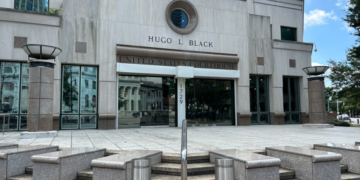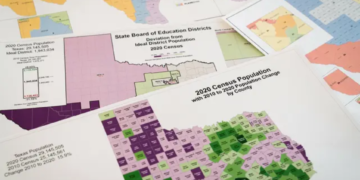Jan 10, 2025 Story by: Editor
TALLAHASSEE — The Florida Senate and Secretary of State Cord Byrd urged a federal judicial panel last week to dismiss a lawsuit challenging the constitutionality of a 2022 Senate redistricting plan. The case argues that two districts in the Tampa Bay area were racially gerrymandered.
Attorneys representing Senate President Ben Albritton, R-Wauchula, and Secretary Byrd submitted motions for summary judgment, aiming to resolve the case without a trial.
The lawsuit, filed in April on behalf of five Tampa and St. Petersburg residents, focuses on Senate District 16 and Senate District 18. Senate District 16, represented by Sen. Darryl Rouson, a Black Democrat from St. Petersburg, spans Tampa Bay to include portions of Pinellas and Hillsborough counties. Senate District 18, represented by White Republican Nick DiCeglie of Indian Rocks Beach, encompasses part of Pinellas County.
According to the plaintiffs, the legislative redistricting plan grouped Black populations from two counties into District 16, which they argue “sacrificed genuine communities of interest” and “unjustifiably packed Black voters into District 16, stripping them from adjacent District 18 and reducing their influence there.” They claim this configuration violated equal-protection rights.
In response, motions filed by the defense disputed these claims. Byrd’s legal team argued that similar bay-crossing districts have existed since at least 1992. They also suggested that the plaintiffs’ proposals aim to create a new Democratic district.
“The alternative maps they offer aren’t meaningfully better when it comes to BVAP (Black voting age population), compactness, or adherence to political and geographic boundaries,” Byrd’s motion stated. “The one meaningful difference is this: Plaintiffs’ alternatives create an extra Democratic seat. That difference can’t upend the state’s choices.”
The Florida Legislature approved the redistricting plan in February 2022, and the new district boundaries were implemented for the 2022 elections. Sen. Rouson secured 63.9% of the vote in District 16, while Sen. DiCeglie won District 18 with 56.9%. Neither district will be on the 2024 ballot.
The district configurations are partly influenced by the 2010 “Fair Districts” constitutional amendment, which requires that new maps do not “diminish” the ability of racial minorities to elect candidates of their choice.
However, the lawsuit claims that the state’s use of race in redistricting was not narrowly tailored to meet the constitutional requirement. It alleges that this led to a violation of federal equal-protection rights.
“The state drew these districts purportedly to avoid diminishing Black voters’ ability to elect representatives of their choice in District 16, but the state unnecessarily used race to disregard traditional, race-neutral redistricting considerations,” the lawsuit stated. “And far from advancing representation, the enacted districts dilute Black voters’ power. The state could have drawn these districts to both avoid the diminishment of Black voting power and respect traditional redistricting criteria. Instead, the state engaged in racial gerrymandering that unconstitutionally abridges plaintiffs’ rights to the equal protection of the laws.”
The Senate’s motion countered by asserting that race was only considered to the extent required by law and was one of several factors influencing the configuration of District 16.
“The undisputed material facts here establish that the Florida Senate permissibly considered race as required by the Florida Constitution, but that race did not predominate over non-racial factors such as compactness, contiguity, population equality, and boundary usage in the development of the enacted plan,” the Senate’s attorneys wrote.
Unlike other legal cases, redistricting lawsuits are heard by three-judge panels. This case is being overseen by Andrew Brasher of the 11th U.S. Circuit Court of Appeals and federal Middle District of Florida judges Charlene Edwards Honeywell and Thomas Barber.
Meanwhile, a separate lawsuit is underway in federal court in Miami, challenging certain state House districts. Additionally, the Florida Supreme Court is reviewing a challenge to a congressional redistricting plan, primarily focused on changes to a North Florida district. Source: Mid Florida News Paper

















